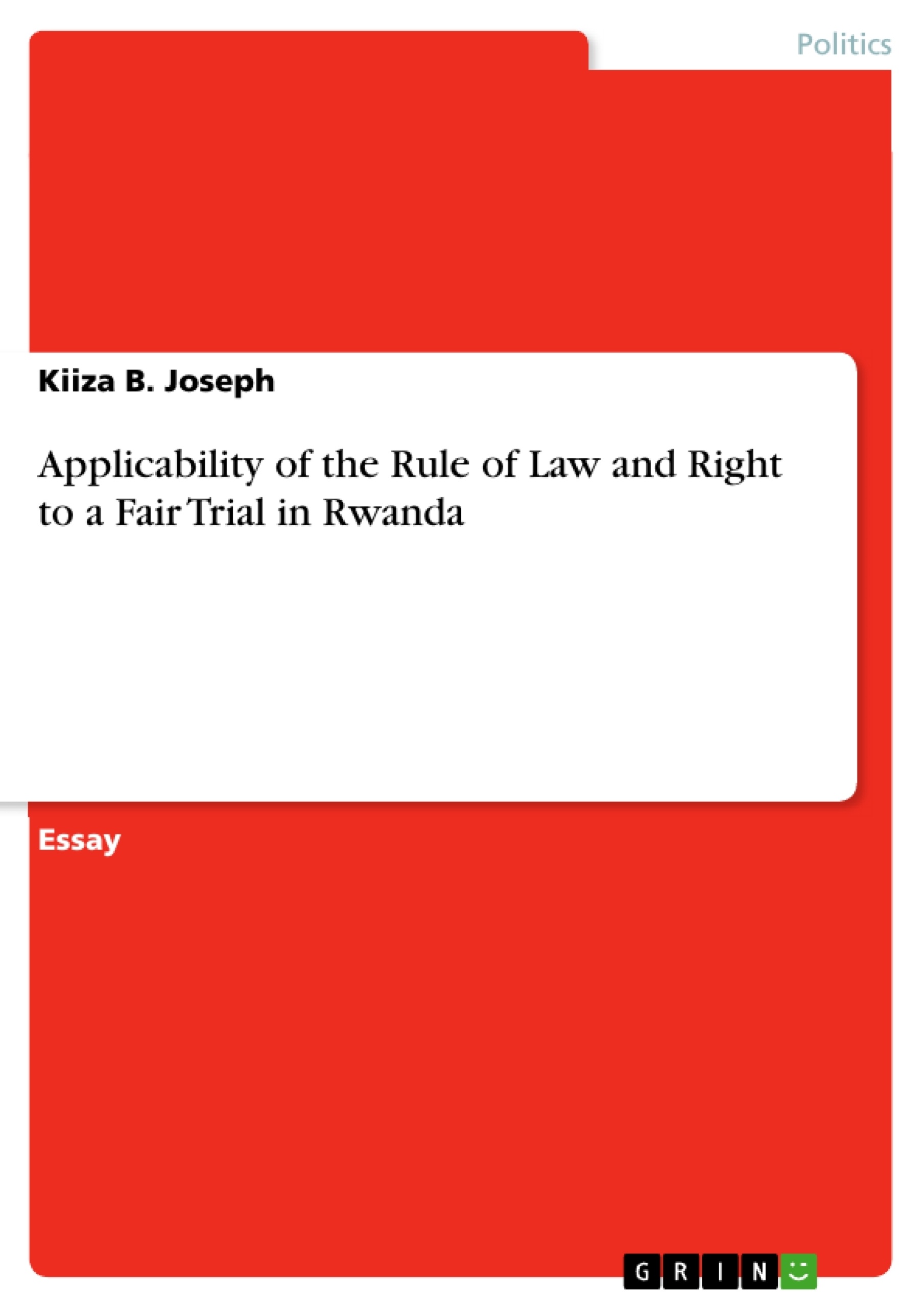This work is guided by the quote “the entire judicial process should not be looked at as an event or even be perceived as a procedure but rather a serious undertaking that ensures the country is governed by the rule of law”(Paul Kagame Judicial Year 2017/18).
Fair trials are the only way to prevent miscarriages of justice and are an essential part of a just society. Every person accused of a crime should have their guilt or innocence determined by a fair and effective legal process. But it is not all about protecting the rights of accused, It also makes societies safer and stronger. Without fair trials, citizens may end up being victimized, without fair trials, trust in government and its institutional rule of law collapses. In a fair trial, parties before court are treated equal to defend themselves and present evidence. They must be heard impartially and without any prejudice. There must be a neutral and impartial judge who would ensure that all procedural requirement have been met and keep in mind the rights of the parties in the trial.
Inhaltsverzeichnis (Table of Contents)
- 1.0 General Background
- 2. Role of the states in respect of "The Right to a Fair Trial"
- 3. Criminal procedure vis-à-vis the right to a fair trial
- 3.1 Arrest and detention of suspects
- 4. Rights of the suspect
- 5. Human Rights and the constitution
- 6. Rwandan Courts of law
- 7. Ignorance of law is no excuse:
- 8. Conclusion
Zielsetzung und Themenschwerpunkte (Objectives and Key Themes)
This work explores the applicability of the rule of law and the right to a fair trial in Rwanda. It examines the principles of fair trials and their role in ensuring a just society, the responsibilities of states in upholding these principles, and the specific legal framework in place within Rwanda. The analysis draws upon international human rights conventions and the Rwandan Constitution.
- The importance of fair trials in preventing miscarriages of justice and fostering a just society
- The role of the state in ensuring the right to a fair trial and upholding the rule of law
- The specific legal framework and procedures related to criminal procedure and the rights of suspects in Rwanda
- The constitutional and legal guarantees for human rights and the rule of law in Rwanda
- The importance of public awareness and education regarding legal rights and responsibilities.
Zusammenfassung der Kapitel (Chapter Summaries)
The opening chapter establishes the significance of fair trials within the context of the rule of law and explores the importance of these principles in preventing miscarriages of justice and fostering a just society. It emphasizes the need for equality and impartiality in legal proceedings.
Chapter 2 examines the role of states in respecting the right to a fair trial. It delves into the provisions of the European Convention on Human Rights, specifically Article 6, which outlines the minimum rights of an accused person, including the presumption of innocence, the right to legal counsel, and the right to a public hearing.
Chapter 3 examines the Rwandan legal framework for criminal procedure, particularly focusing on the arrest and detention of suspects. It analyzes the provisions of the law relating to the code of criminal procedure, including the rights of suspects during arrest and detention.
Chapter 4 explores the rights of a suspect within the Rwandan criminal justice system, emphasizing the right to legal counsel, the right to be informed of charges, and the procedures for interrogation.
Chapter 5 examines the relationship between human rights and the rule of law in Rwanda, emphasizing the constitutional guarantees for human rights and the role of the government in upholding these principles. It explores how the Rwandan government strives to ensure that its practices are grounded in democratic values.
Chapter 6 delves into the structure and organization of the Rwandan court system, providing an overview of its various levels and the appointment of judges. It highlights the judiciary's independence from the legislative and executive branches.
Chapter 7 explores the principle of "ignorance of the law is no excuse" within the Rwandan context. It highlights Rwanda's commitment to upholding human rights and its efforts to promote public awareness of these rights through education and other initiatives.
Schlüsselwörter (Keywords)
The main keywords and focus topics of this work include fair trial, rule of law, criminal procedure, Rwandan legal system, human rights, presumption of innocence, legal representation, arrest and detention, interrogation, and public awareness of rights.
Frequently Asked Questions
What are the key elements of a fair trial in Rwanda?
Key elements include equality before the court, impartial judges, the right to present evidence, and adherence to procedural requirements without prejudice.
How does the Rwandan Constitution protect human rights?
The Constitution provides legal guarantees for the rule of law and human rights, ensuring that judicial practices are grounded in democratic values.
What are the rights of a suspect during arrest in Rwanda?
Suspects have the right to be informed of charges, the right to legal counsel, and specific protections during interrogation as outlined in the code of criminal procedure.
Is the Rwandan judiciary independent?
Yes, the Rwandan court system is designed to be independent from the legislative and executive branches to ensure impartial justice.
Does "ignorance of the law" serve as an excuse in Rwanda?
Generally, ignorance of the law is no excuse, which is why the Rwandan government promotes public awareness and education regarding legal rights.
- Citar trabajo
- Kiiza B. Joseph (Autor), 2019, Applicability of the Rule of Law and Right to a Fair Trial in Rwanda, Múnich, GRIN Verlag, https://www.grin.com/document/460931



